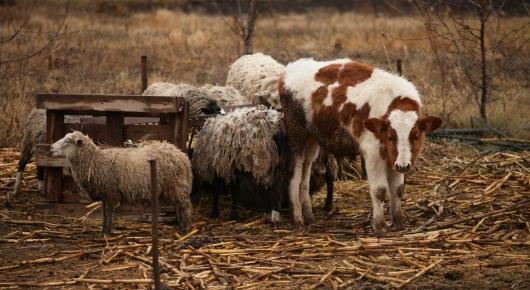UN-FAO supports transformation of agriculture sector in eastern Ukraine

Continued armed conflict and related instability have inflicted enormous losses on the agricultural sector in Ukraine’s Donetsk and Lugansk regions. Yet, as the rest of the economy declines subsistence farming has taken on new importance. It could even become a driver of the local economy, according to a report released today by the UN Food and Agriculture Organization (FAO).
Farmers along the conflict line face high interest rates, difficult access to financing, lack of farm machinery for lease, and no remaining markets for their milk, vegetables or fruit. Nevertheless, one in four adults in the affected area would like to start his or her own business in the agriculture sector, FAO found.
The main objective of the study was to identify practical models for sustainable food systems and enhanced agrifood value chains, more competitive agrifood enterprises, improved quality of agrifood products, and better marketing.
According to the study, these goals can be achieved by helping targeted groups of farmers restart or improve their agricultural production.
Key findings
- The main problems faced by farmers in eastern Ukraine are poor targeting and prioritization of the region by national agribusiness support programmes, and high prices for farming inputs and other needs
- Regional experience has shown that value chain development is the most effective way to grow sustainable, commercially viable rural businesses that provide employment and livelihoods
- Small-scale farmers face difficulties in registering land and other properties
- Over 90 percent of small and mid-sized farms experience problems with logistics and have no processing capacity.
“There is a significant and urgent need to support the initiatives of the small and medium-scale farmers to advance their production, processing and marketing and stabilize the local economy,” said Farrukh Toirov, coordinator of FAO’s emergency programme in Ukraine. “Addressing these needs would bring sustainable solutions to low-income and food-insecure people, and at the same time help integrate the sizeable population of internally displaced.”
‘Addressing these needs would bring solutions to low-income and food-insecure people, and help integrate
the sizeable population of internally displaced.’
Farrukh Toirov
FAO emergency coordinator in Ukraine
The current study is FAO’s third comprehensive analysis of agriculture in eastern Ukraine after it published two editions of a socio-economic impact and needs assessment of rural households along the contact line.
“FAO is applying a comprehensive approach of analyzing value chains of the various food products, identifying the leverage points and tailoring programmes to address the needs,” said John O’Connell, FAO agrifood economist for Europe and Central Asia.
“Application of this methodology is even more important in areas affected by crises, such as we see now in Donetsk and Luhansk regions,” O’Connell continued. “The value chains are broken because of ongoing instabilities.”
In order to analyze the economic impact of the conflict and identify recovery needs, FAO collected feedback from rural residents in the two regions.
The FAO report points to an urgent need for a business-enabling environment, and recommends improved access to investments and finance, improved rural services, and application of a value chain approach.
3 October 2017, Kyiv, Ukraine
